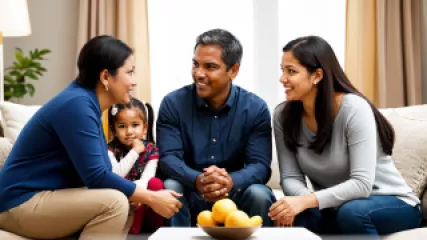Top 7 Strategies for Peaceful Family Conflict Resolution
Family conflicts are a natural part of life, but finding peaceful resolutions can be a challenge. Whether it's a disagreement between siblings, a clash between parents and children, or tensions among extended family members, conflict within the family can create strain and disrupt the harmony of household dynamics. However, with the right strategies and skills, it is possible to navigate these conflicts and foster more peaceful family relationships.
1. Effective Communication
Communication lies at the heart of resolving conflicts within the family. Open and honest dialogue allows all parties involved to express their thoughts and emotions, fostering understanding and empathy. To improve family communication:
- Encourage active listening: Pay attention to what others are saying without interrupting or formulating responses in your mind.
- Use "I" statements: Express your feelings and needs without blaming or criticizing others.
- Avoid defensive or aggressive language: Instead, adopt a calm and respectful tone.
- Practice non-verbal communication: Pay attention to body language and facial expressions to convey empathy and understanding.
2. Seek Professional Help
In some cases, family conflicts may require the guidance of a therapist for family conflicts. A trained professional can provide an unbiased perspective and offer valuable insights and tools for resolving conflicts. They can help family members develop conflict resolution skills and improve overall communication within the family unit.
3. Foster Empathy
Empathy is the ability to understand and share the feelings of another person. Cultivating empathy within the family can lead to more compassionate and understanding interactions. Some ways to foster empathy include:
- Encourage perspective-taking: Put yourself in the shoes of other family members to gain insight into their experiences and emotions.
- Teach emotional literacy: Help family members identify and express their emotions effectively.
- Promote active listening: Encourage family members to listen attentively to each other's perspectives and validate their feelings.
- Lead by example: Show empathy towards others in your own actions and interactions.
4. Practice Active Problem-Solving
Conflict resolution often involves finding solutions that satisfy the needs of all family members involved. By practicing active problem-solving techniques, families can work together to find mutually beneficial resolutions. Some strategies for active problem-solving include:
- Identify the problem: Clearly define the issue at hand and ensure all family members have a shared understanding.
- Brainstorm solutions: Encourage everyone to contribute ideas without judgment or criticism.
- Evaluate options: Assess the pros and cons of each proposed solution.
- Choose a resolution: Select the solution that best meets the needs and interests of all family members.
- Create an action plan: Develop a plan to implement the chosen resolution and monitor progress.
5. Establish Boundaries and Ground Rules
Setting boundaries and establishing ground rules can help prevent conflicts from escalating and provide a framework for healthy family dynamics. Some guidelines for establishing boundaries include:
- Clearly communicate expectations: Discuss and establish clear expectations for behavior and responsibilities within the family.
- Respect individual differences: Recognize and appreciate each family member's unique qualities and preferences.
- Define personal space: Allow family members to have personal time and space to pursue their interests and recharge.
- Create conflict resolution guidelines: Develop a set of rules and strategies for resolving conflicts when they arise.
6. Practice Forgiveness
Forgiveness is a powerful tool in resolving family conflicts and rebuilding trust and harmony. It involves letting go of resentment and grudges and moving towards reconciliation. To practice forgiveness:
- Acknowledge and express emotions: Allow yourself to feel and process the emotions associated with the conflict.
- Seek understanding: Gain insight into the other person's perspective and motivations.
- Choose to forgive: Make a conscious decision to let go of anger and resentment.
- Communicate your forgiveness: Express your forgiveness to the other person, promoting healing and reconciliation.
7. Prioritize Self-Care
In the midst of family conflicts, it is crucial to prioritize self-care to maintain emotional well-being. Taking care of yourself allows you to approach conflicts with a clear mind and a calmer disposition. Some self-care practices include:
- Engage in activities you enjoy: Dedicate time to hobbies, exercise, or other activities that bring you joy and relaxation.
- Practice stress management techniques: Find healthy ways to cope with stress, such as deep breathing exercises, meditation, or journaling.
- Set personal boundaries: Learn to say no when necessary and prioritize your own needs.
- Seek support: Reach out to friends, support groups, or therapists to talk about your feelings and gain perspective.
By implementing these strategies, families can improve their conflict resolution skills and foster healthier dynamics. Remember, conflicts are an opportunity for growth and learning, and with patience, understanding, and effective communication, families can navigate conflicts and strengthen their bonds.






